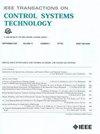通过高斯过程实现位置相关运动前馈:应用于半导体设备的咬合和力波纹
IF 4.9
2区 计算机科学
Q1 AUTOMATION & CONTROL SYSTEMS
引用次数: 0
摘要
下一代数据密集型运动系统对高精度和高吞吐量的要求,使得位置相关前馈变得至关重要。本文旨在通过自动化实验设计的系统学习,开发一个可解释且任务灵活的位置相关前馈框架。通过采用高斯过程(GP)回归,开发了一个数据驱动和可解释的框架,使前馈参数的精确建模成为位置的连续函数。通过迭代学习控制(ILC)算法,可以有效地收集和说明数据。此外,通过利用 GP 的不确定性估计和指定的第一原理知识,提出了自动确定训练位置的实验设计框架。两个相关案例研究显示了该方法在简化的 1-D 晶圆平台仿真中用于位置依赖性快速前馈的重要性和显著的性能改进,以及在工业绕线机中用于位置依赖性电机力恒定补偿的实验应用。本文章由计算机程序翻译,如有差异,请以英文原文为准。
Position-Dependent Motion Feedforward via Gaussian Processes: Applied to Snap and Force Ripple in Semiconductor Equipment
The requirements for high accuracy and throughput in next-generation data-intensive motion systems lead to situations where position-dependent feedforward is essential. This article aims to develop a framework for interpretable and task-flexible position-dependent feedforward through systematic learning with automated experimental design. A data-driven and interpretable framework is developed by employing Gaussian process (GP) regression, enabling accurate modeling of feedforward parameters as a continuous function of position. The data is efficiently collected and illustrated through an iterative learning control (ILC) algorithm. Moreover, a framework for experimental design in the sense of automatically determining the training positions is presented by exploiting the uncertainty estimates of the GP and the specified first-principles knowledge. Two relevant case studies show the importance and significant performance improvement of the approach for position-dependent snap feedforward for a simplified 1-D wafer stage simulation and experimental application to position-dependent motor force constant compensation in an industrial wirebonder.
求助全文
通过发布文献求助,成功后即可免费获取论文全文。
去求助
来源期刊

IEEE Transactions on Control Systems Technology
工程技术-工程:电子与电气
CiteScore
10.70
自引率
2.10%
发文量
218
审稿时长
6.7 months
期刊介绍:
The IEEE Transactions on Control Systems Technology publishes high quality technical papers on technological advances in control engineering. The word technology is from the Greek technologia. The modern meaning is a scientific method to achieve a practical purpose. Control Systems Technology includes all aspects of control engineering needed to implement practical control systems, from analysis and design, through simulation and hardware. A primary purpose of the IEEE Transactions on Control Systems Technology is to have an archival publication which will bridge the gap between theory and practice. Papers are published in the IEEE Transactions on Control System Technology which disclose significant new knowledge, exploratory developments, or practical applications in all aspects of technology needed to implement control systems, from analysis and design through simulation, and hardware.
 求助内容:
求助内容: 应助结果提醒方式:
应助结果提醒方式:


